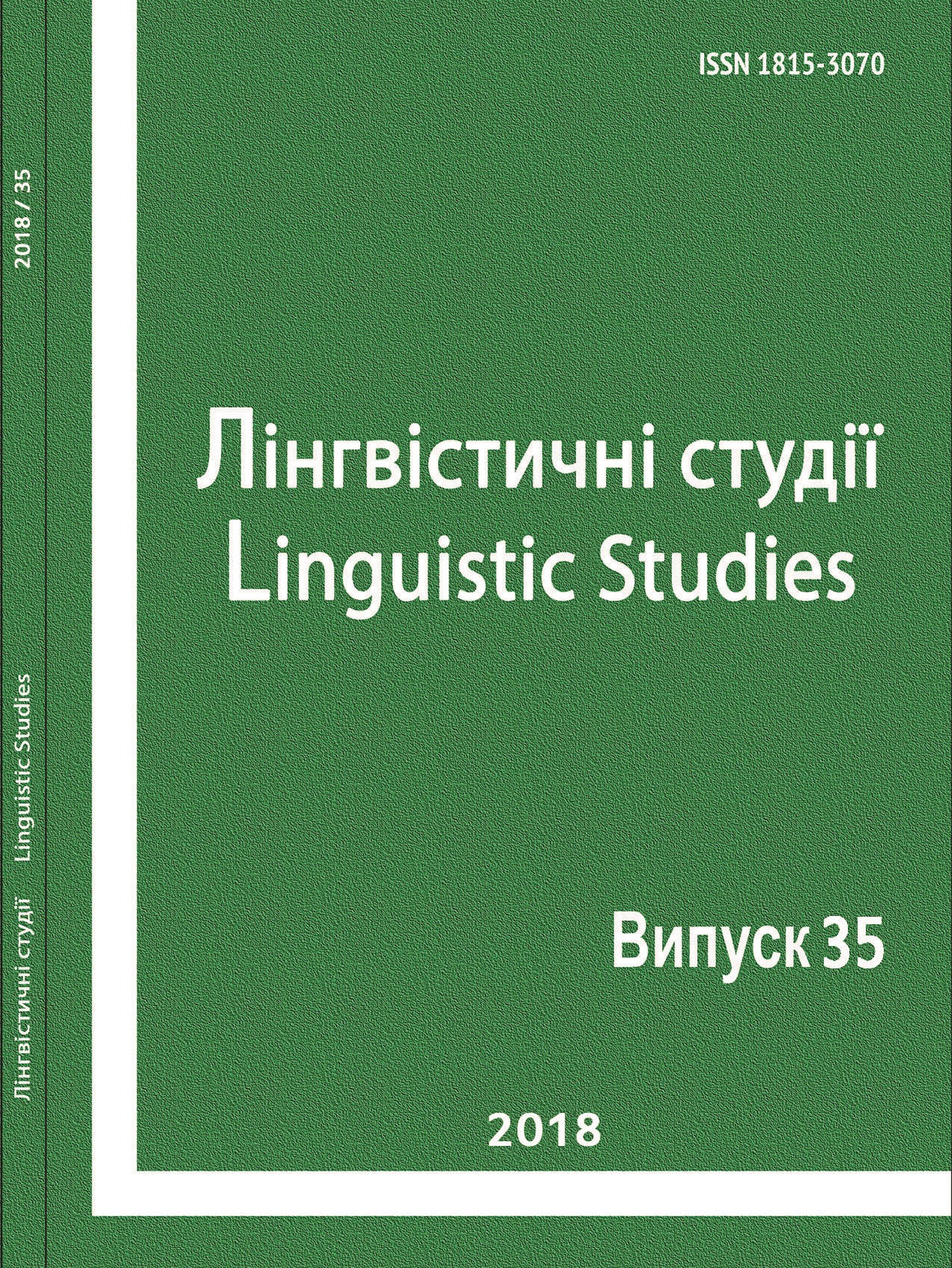Категорійний статус німецького субстантивованого партиципа.
DOI:
https://doi.org/10.31558/1815-3070.2018.35.5Schlagworte:
субстантиват, синкретизм, граматична категорія, лексико-семантична група, частиномовна транспозиція, дериват, антропономінацяAbstract
Статтю присвячено комплексному вивченню субстантивованого партиципа (СП) сучасної німецької мови з метою з’ясування його гібридних лексико-граматичних властивостей. У німецькій мові можуть субстантивуватися як перші, так і другі партиципи, що пов’язано з необхідністю детального та нюансованого найменування людини за її якостями (антропономінація). Важливим способом найменування особи є такий різновид транспозиції, як синкретична граматикалізація – у нашому випадку наділення партиципа властивостями іменника (рід, число, відмінок, означеність / неозначеність), прикметника (ступені порівняння, абсолютність / відносність) і дієслова (час, стан, вид). При цьому одна частина СП виступає як група узуальних субстантиватів, зафіксованих словниками, а інша – оказіональних, що постають як контекстуальні номінації.Literaturhinweise
Babaytseva, Vera. Yavlenyya perekhodnosty v hrammatyke russkoho yazyka (Phenomena of Babaytseva, Vera. Yavlenyya perekhodnosty v hrammatyke russkoho yazyka (Phenomena of Transitivity in the Russian Grammar). Moskva: Drofa, 2000. Print.
Bally, Charles. Obshchaya lynhvystyka y voprosi frantsuzskoho yazyka (General Linguistics and Issues of French). Moskva: Ynostrannaya lyteratura, 1955. Print.
Behaghel, Otto. Deutsche Syntax. – Bd. I. Heidelberg: Niemeyer, 1923. Print.
Blatz, Friedrich. Neuhochdeutsche Grammatik mit Berücksichtigung der historischen Entwicklung der deutschen Sprache. Bd. 1. Karlsruhe: Lang’s Verlagsbuchhandlung und Buchdruckerei, 1895. Print.
Engel, Ulrich. Deutsche Grammatik. – Heidelberg : Groos, 1991. Print.
Grimm, Jakob. Deutsche Grammatik. 4. Teil. Göttingen: Dieterichsche Buchhandlung, 1837.
Fleischer, Wolfgang und Barz Johannes. Wortbildung der deutschen Gegenwartssprache. Tübingen: Niemeyer, 1995. Print.
Heyse, Johann Christian. Deutsche Grammatik. Hannover, Leipzig: Hansche Buchhandlung, 1893. Print.
Kinakh, Liliana. Nominatyvni ta komunikatyvni vlastyvosti substantyvovanoho prykmetnyka suchasnoyi nimets'koyi movy (Nominative and Communicative Properties of the Substantivized Adjective of Modern German). Diss. Luts'k: Volyns'kyy natsional'nyy universytet, 2013 Print.
Kuryłowich, Ezhy. Ocherky po lynhvystyke (Notes on linguistics). – Moskva: Ynostrannaya lyteratura, 1962. Print.
Mel'chuk, Yhor'. A. Kurs obshchey morfolohyy (Course In General Morphology). Moskva – Wien: Progress, 1997. – T. 1. Print.
Paul, Hermann. Deutsche Grammatik. Bd. 3. Halle a. S.: Niemeyer, 1956. Print.
Plunhyan, Vladymyr. Obshchaya morfolohyya. Vvedenye v problematyku (General Morphology. Introduction to Subject Matter). Moskva: Edytoryal, 2003. Print.
Prykhodko, Anatoliy. Nominatyvni vlastyvosti substantyvovanoho partytsypa nimets'koyi movy (Nominative Properties of the Substantivized Participle of German). Studia philologica. Kyyiv: Kyyivs'kyy universytet imeni Borysa Grinchenka, 2016. – No. 7. Print.
Syrotyna, Ol'ga. Substantyvatsyya chastey rechy v sovremennom nemetskom yazike (Substantivation of Parts of Speech in Modern German). Voronezh: Voronezhskyy unyversytet, 1982. Print.
Weinrich, Harald. Textgrammatik der deutschen Sprache. Mannheim [u.a.]: Dudenverlag, 1993. Print.
Ysmaylova, Dylyara. K probleme razgranychenyya substantyvatsyy y konversyy (To the Problem of Differentiation between Substantivation and Conversion). Vestnyk Chuvashskogo unyversyteta. No. 5. 2006. http://cyberleninka.ru/article/n/k-probleme-razgranicheniya-substantivatsii-i-konversii. Web. 2 Feb. 2018.
Zifonun, Gisela. Grammatik der deutschen Sprache in 3 Bdn. Berlin: Walter de Gruyter, 1997. Print.


